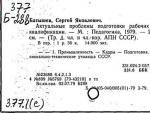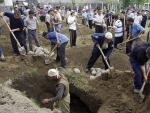Line for processing plastic bottles into granules. Business plan: recycling plastic bottles
Plastic is one of the main enemies for all living things. That is why for decades humanity has been fighting against packaging and bottles that pollute the environment. Based on the results of research conducted by scientists, a clear conclusion was made that plastic decomposition takes about two hundred years.
During this period, this waste poisons the territory in which it is located. It is worth saying that every year production plastic packaging worldwide is increasing at a rapid pace. This is the main reason for the increase in the amount of waste from this material.
Solving an environmental problem
Today, in order to stop plastic pollution of the planet, it is necessary to completely abandon its production. However, this option is unrealistic. The fact is that plastic is a universal and cheap material that is used in almost all areas of human activity. Moreover, on this moment worthy alternative he doesn't exist.
Reducing the amount of hazardous waste can be helped by limiting the production of environmentally unsafe packaging. This method is currently used in many foreign countries. For example, in European stores plastic bags replaced with paper ones, which do not harm the environment and can decompose in two to four weeks when disposed of.
Reducing the amount of plastic waste can also be achieved by recycling this material. The bulk of packaging that needs to be recycled is bottles. Almost all manufacturers of carbonated and mineral waters they are poured into plastic bottles. In this regard, the problem of disposal arises. Solving it, you can open own business on plastic bottles.
Waste collection
Before organizing the acceptance of PET bottles, you should carefully study the experience of European businessmen. Special machines are installed at retail outlets in most countries. Their main purpose is to collect PET bottles. If you carefully study this issue, you can conclude that you can make money from such waste. However, this is not easy to do. Currently in Russia, PET bottles are accepted by only one company, which is assisted by the Moscow government.
Types of slot machines
The device with which PET bottles can be received is a special container for packaging. In this case, to determine the object, it is scanned. In world practice, there are two types of such machines. The first of them includes those that scan and accept PET bottles. The second type of machines is designed for collecting aluminum containers.
Operating principle
“Smart” containers are called fandomats. Collection machines plastic bottles and aluminum containers exchange recyclable packaging for money. In these containers, the volume and weight of the container are determined, and barcodes are recognized, allowing the object to be identified.
The automatic collection machine for plastic bottles and aluminum containers is equipped with a microclimate system that maintains certain humidity and temperature values and allows the device to operate smoothly.
Acquisition
The production of such machines is established in Germany. In this regard, the price of this equipment is considerable. The cost range of fandomates is from four thousand eight hundred to seven thousand euros.

Should I buy such a machine or not? When starting his own business, every entrepreneur draws conclusions about the payback period for the equipment he purchases. Collecting plastic bottles as a business is not an easy task. That is why, before taking certain steps, it is necessary to enlist the support of government agencies.
The vending business will advance faster and bring real profits when the collection of plastic containers is combined with its recycling. These two processes are practically inseparable from each other. In order to process raw materials, they must first be collected. Wherein best place will serve to accommodate fandomats trading floors shops or the area in front of the entrance to super- and minimarkets.
Business profitability
Let's assume that there are two thousand fandomats installed in the city. It is most profitable to accept aluminum containers. The container for its collection can hold up to four hundred cans. Consequently, the daily supply from all fandomats will be 800,000 cans.
The cost of aluminum raw materials ($1.28 per kilogram) will result in daily revenue of $25.5 thousand. Of this, the machine will pay 18.5 thousand dollars to those who put the cans into it. As a result, the daily profit will be seven thousand dollars. But do not forget that it will take twelve million euros to purchase such a number of fandomates.
Thus, when favorable conditions making a profit is possible only five to six years after starting a business. However, we did not include the costs of administration, logistics and technical support in our calculation. The conclusion is clear. In order to build a network of fandomates, government assistance will be required.
Collection and processing
Statistics from global practice indicate that packaging and receiving containers are the most unprofitable links in the plastic recycling chain. This state of affairs exists in almost all countries. For business a necessary condition is a budget subsidy and support from the city authorities.
The next stage, plastic recycling, is more profitable. There is a certain opinion of experts. According to it, the payback of a waste processing enterprise is achieved within one to two years from the moment of its opening.
At the same time, on average, profitability indicators reach twenty-five percent. Higher income can be obtained by combining two processes - collection and processing plastic containers. However, to open such a business, government subsidies will certainly be needed.
Additionally, some experts believe that fandomaths in Russia currently operate the wrong reward scheme. Thus, in Germany, a person who throws a bottle or can into the device is given a special coupon, which allows them to reduce the cost of products purchased in the store. In our country, it is easier for a person to throw an empty bottle into the trash bin than to go to a fandomat, which will give him some small change in exchange for the container.
Some experts believe that there is another way to attract attention to the device for collecting plastic bottles. If the fandomat fulfills in exchange for the container musical composition or “tells” a joke, then people will walk not to the ballot box, but to him. This can achieve significant savings Money for issue.
Use of waste plastic
Despite the difficulties of the business of accepting PET bottles, there are plans to expand the network of fandomates in Russia. How is waste plastic used?
Recycled PET serves as a material for the manufacture of synthetic yarns, fibers and geotextiles.

Almost thirty percent of waste is spent for these purposes. PET fibers are used for car upholstery. They are used to make carpets for offices and homes. European standard PET is used in the production of polyester fabric. This material is used as insulation for sleeping bags and sportswear, and also as a filler for soft toys. If the fiber is fine, it is used in the production of artificial wool for scarves, sweaters and knitted shirts.
Conclusion
Creating a business for collecting and recycling PET bottles and aluminum containers will require a lot of effort and time. At the same time, state support is important. However, having overcome all the obstacles, you will be able to achieve an unprecedented result, and then all costs will be covered by income. The most important thing is to believe in success, and then everything will certainly work out.
Removal, processing and disposal of waste from hazard classes 1 to 5
We work with all regions of Russia. Valid license. A complete set of closing documents. Individual approach to the client and flexible pricing policy.
Using this form, you can submit a request for services, request a commercial offer, or receive a free consultation from our specialists.
The problem of disposal and recycling of PET bottles is one of the most pressing. This is due to the fact that questions about improvement environmental situation and returning them back to production are quite difficult.
In order for the line for recycling such bottles to develop more and more, various activities are offered for the collection and sorting of such waste.
The problem of recycling polyethylene terephthalate
PET recycling is a problem in big cities. Immediately after the holidays, a huge number of plastic glasses and bottles are strewn all over the streets of the city. In addition, the same waste can be seen in places where vacationers often gather. But they think about the fact that plastic is an essential ecological problem, which concerns absolutely everyone.
If you seriously take up such a just cause and build your own business, the main task of which will be the processing of such waste, then it is quite possible to provide for yourself financially, while saving the environment. This type of business is considered the easiest to open.
Local governments often meet halfway and also help in every possible way those who wish to open enterprises of this kind. IN modern times Bottle recycling is one of the most profitable segments of the entire recycling market.
Business plan
A business based on processing this type of waste is profitable in every sense:
- Relatively small investment for equipment (more on this below).
- A huge amount of potential raw materials. Every year, each person throws out about 300 kilograms of garbage, and a third of this number, ≈ 100 kilograms, are PET bottles.
- Such activities are encouraged by the state by reducing or completely eliminating some taxes. It is worth adding this to the plan when developing it.
- Fairly quick payback. From 2 to 3 years.

PET collection and sorting process
Conventionally, the processing process can be divided into 5 stages:
- Plan for collecting PET containers. There are several ways to collect raw materials:
- Waste collection points.
- Collection on garbage dumps, for this you will have to conclude an agreement with the owner.
- Place containers on the streets for sorting waste: plastic, paper and glass. It is considered the most civilized method, but in the realities of Russia it is practically irrelevant due to the low environmental culture of the country’s inhabitants. It will be much easier and more effective to enter into an agreement with the owner of the landfill.
- Sorting plan. As a rule, PET bottles are divided into painted and unpainted. After which each color is processed separately.
- Selection. From the general raw materials, it is necessary to select polyvinyl chloride (PVC) bottles. Such waste is processed using a different technology.
- Cleaning. Foreign objects in the trash are removed.
- Pressing. Each type of bottle is pressed into square bales of various sizes. They are immersed in specialized equipment, which in the future converts the raw material into flexible material.

Expenses and income
It is impossible to open a business without investment. But there is a nuance: such activities are extremely useful for the city, so the administration will do everything possible to support your desire to open such a business.
To do this you will need:
- 3,000,000 rubles for equipment.
- 30,000 rubles for initial raw materials.
- 10,000 rubles for utilities.
- 120,000 rubles for wages.
This is approximately 3,200,000. It seems that the amount is quite large, but the monthly income from such production is about 200,000 rubles. And the payback period, as mentioned above, is 2 - 3 years.
Recycling polyethylene bottles
What is useful for organizing such a business? First, you need to register a company, because this business is not trading in small goods, which is allowed to begin even before opening an individual enterprise (individual entrepreneurship). After all this, you will need a special room, as well as special equipment for processing such waste.
Next, we move on to careful processing of the collected raw materials. The line for recycling such bottles (clean and contaminated) processes waste into materials that can be reused - flakes (flex), and subsequently into granules.
Bottle recycling goes through a full cycle of thorough washing and cleaning various kinds mud and oil types of pollution. In addition to this sorting, other operations are performed in automatic mode, which is a waste sorting line.
The most standard configuration consists of two sections:
- Washing and complete grinding.
- Granulation of the resulting flakes.
The further granulation process of the flakes is carried out using a special parallel twin-screw extruder.

Recycling of polyethylene bottles
The processing line allows the finished material to be used in various industries:
- As an additive to the base material for the manufacture of new products.
- For the production and receipt of bottles for a wide variety of technical purposes.
- In the process of compounding and fusion with various types of plastics.
- In addition, recycled material can be used to make building materials.
Most people will notice this problem probably only when a huge amount of waste envelops us completely. Bottle recycling is serious problem, for which it is not so difficult to create a business plan. Today this activity is very profitable occupation, despite the fact that you will have to purchase special equipment.
Plastic bottles make up a significant portion of household waste.
Plastic accumulations on landfills lead to serious environmental problems.
It is a known fact that PET bottles take more than 200 years to decompose, and deposits of this material can turn the planet into a giant landfill. When they decompose, toxic substances are also released.
Equipment for recycling plastic bottles allows you to reduce the amount of manual labor. Recycling plastic can not only significantly improve the environment, but also generate impressive income. Moreover, you can use recycled PET raw materials an unlimited number of times.
The latest technologies for recycling recyclable materials make it possible to obtain from PET bottles fuel. For example, Envion recycles PET containers to produce synthetic automotive fuel.
However, this technology is much inferior in terms of profitability to the common technology for producing recycled plastic in the form of granules.
The process of producing polyethylene granules takes place in several main stages:

- Plastic sorting according to color and type and subsequent cleaning. If there is no need for further processing, then compressed PET bottles are sold as secondary raw materials.
- Usage crushing equipment to obtain homogenized plastic crumbs.
- Flushing the resulting plastic mass to remove dirt, glue and labels.
- Drying, allowing to minimize the remaining moisture.
- Agglomeration through heat treatment.
- Granulation to small granules.
Failure to completely remove contaminants, labels, adhesives and other components will increase wear and tear on the equipment, and foreign objects may even destroy the crusher. Even a slight residue of glue on the raw material can adversely affect the color and quality of the resulting polymer.
Brief overview of the equipment
All modern lines that allow processing PET bottles into recyclable materials contain:
- vibrating sieve, to remove solid impurities;
- conveyor for sorting plastic;
- crusher for crushing bottles;
- centrifuge for drying with label separator;
- plug separator, based on the fact that the density of plastic crumbs allows them to sink to the bottom and be transmitted further by the line. In this case, the floating cork crumbs are transported to another container, where they are removed.
- secondary washing followed by drying to obtain plastic chips suitable for subsequent processing.
Minimum production

Equipment set for small and medium production:
- conveyor or sorting table
- special
This set of equipment is completed small collection points where the bottles are subject to sorting and baling.
Labels, as well as plugs and PVC rings can be removed manually beforehand.
Bottles pressed into a bale take up ten times less space.
 Eg, press from the mini series has a price of 70–75 thousand rubles.
Eg, press from the mini series has a price of 70–75 thousand rubles.
This type of press is ideal for a small collection point.
It allows you not to accumulate the resulting raw materials, but to immediately press them into bales.
In such a compact form, transportation and storage are much more profitable and convenient.
Additional equipment
Recycling equipment can also expand to include:
- crushing machine, combining several functions
- special washing container
- drying
- extruder instead of a conventional granulator
When collecting raw materials yourself, the bottles are sorted and then the labels and corks are removed. The next step is to crush the bottles until you get homogeneous plastic chips.
The crushed mass is obtained through the process of washing and removing dirt and adhesive residues. The next step is drying and granulation.
Using an extruder, you can produce plastic thread or another product of a given shape instead of granules.
The average price of a crusher, for example, a model such as AMD-200D, starts from 98 thousand rubles.
Popular lines
The most affordable machines recycling bottles made of plastic, belong to baling type. The most popular of them are:
- press PRESSMAX 530, a universal machine based on imported components:
- hydraulic pump brand Marzocchi and Vivoil,
- MPspaFILTRI filter elements,
- Badestnost distributors.
average price equipment costs 220 thousand rubles.
- crusher "AMD-600D", with a productivity of up to 120 kg/hour. It is characterized by its small size and low power consumption. Very easy and intuitive controls price from 120 thousand rubles.
- centrifuge for drying polymer materials “S-TSR-30” with a maximum productivity of 400 kg/hour. Operating power is 20 kW/hour. Removes with water all residual fine particles: dirt, dust, sand and PVC. average cost is about 140 thousand rubles.
- Extruder. The full cycle also implies the presence of an extruder - a machine that allows you to mold plastic materials. The cost of such a polymer and plastic granulator depends on the desired performance. The efficiency of such equipment is best calculated when the volumes of available raw materials are precisely known. Average price from 64 thousand rubles.
Price and equipment
The minimum cost of processing equipment is about 4 million rubles. For example, the cost of a mobile mini-plant for processing PET bottles PET mobile-250 is approximately 160 thousand euros.
About 400 thousand will be required to install equipment. The cost of the required elements of the production workshop:
- agglomerator ≈ 250 thousand
- granulation line ≈ 1.5–2.5 million
- rotary chopper ≈ 2 million
Components of the finished line:
- container for soaking flex
- dynamic centrifuge for cleaning plastic
- hot bath
- dispenser
- friction screw
- rinsing bath
Domestic equipment is much cheaper (≈ 1.5 million rubles). However, it is often more susceptible frequent breakdowns and has lower productivity.
The leaders among equipment manufacturers are:
- Redoma,
- Herbold,
- Sorema,
- Shredder,
- RIKO RT.
Costs and profitability
Payback such a business is key point production planning.
To buy a fully equipped line, you will need about 4 million rubles. Average productivity will be from 0.8 to 1 ton per hour. Total energy consumption is 73 kW per hour.
No more than six people will be required to service the production. At the same time, they will be busy mainly with loading and unloading operations. The efficiency of each worker is about 120 kg/h. Wage about 15–20 thousand rubles per month.
For full production you will additionally need:
- manager,
- accountant.
The cost of a ton of raw materials (this is approximately 25,000 plastic bottles) is from 3 to 6 thousand rubles. With an 8-hour working day, the gross income will be approximately 350 thousand rubles per month. Including all payments payback of such equipment will be from 18 to 36 months.
conclusions
Now is the most favorable moment to purchase equipment and create an enterprise for processing plastic containers. A little more time and the barrier to entry into this market will become much higher, as will the competition.
The Internet is replete with advertisements for buying and selling food-grade plastic. A huge volume of plastic bottles are simply thrown into the trash. Next, valuable raw materials end up in city landfills and rot there for years instead of being recycled.
You can start by organizing a collection point for PET containers, which will save you from transportation costs. You can also enter into an agreement with enterprises that produce significant volumes of PET waste. A stable source of raw materials is essential.
Opening an enterprise for processing plastic bottles into secondary raw materials will require proper selection of equipment. Cheap ones can quickly fail, but expensive ones will have a significant payback period.
The advantage is that you can start with a minimum set of equipment. As income grows, some operations can be automated through the purchase of specialized machines.
PET recycling equipment in action can be seen in a short video:
In contact with
It takes about 300 years for a plastic bottle to completely decompose, and they cannot be burned, as this leads to pollution environment. Therefore, they are usually simply buried in the ground. However, you can make good money from this garbage by recycling it. City administrations are interested in improving the environmental situation, so it is likely that you can count on receiving various preferences and discounts when organizing a workshop for recycling plastic bottles.
Sources of raw materials
If you want to open a mini-factory for processing plastic bottles, then the first thing you need to find out is whether you can find enough raw materials. It can be obtained in several ways:
- sign agreement with the landfill;
- organize reception points bottles from the population for a small fee;
- spread around the city ballot boxes For separate collection garbage in which people will throw away including plastic bottles
At first glance, it may seem that getting bottles that people throw away is not a problem. However, in reality this is not the case. All recyclable materials that are in landfills have already been divided between interested companies, and becoming the owner of this plastic is, as a rule, very difficult.
By organizing collection points, you can count on receiving bottles directly from the population, but you will need to spend on advertising and pay for the containers accepted. 
By placing bins around the city for separate waste collection, you can receive raw materials for free. To do this, you will have to first agree with the city administration - most likely, she will not mind. A cheaper option is to put bins just for plastic, but in this case you will have to be prepared for the fact that people will simply start throwing everything into them.
Mini-plant for processing plastic bottles: preparation for opening
If you are confident that you can obtain sufficient quantities of raw materials, you need choose a legal form and taxation system. Suitable for a PET bottle recycling business.
When registering, you must select the processing of non-metallic waste and scrap as a type of activity, which takes place under number 37.20.
Equipment for recycling plastic bottles
In a workshop for processing PET bottles, the following equipment may be needed:
- installation for removing caps and removing labels;
- crusher;
- steam boiler;
- polishing machine;
- rinsing machine;
- drying unit.
Equipment for recycling plastic bottles can be purchased new or purchase installations, a machine for processing plastic bottles, already used, purchase the entire line entirely or cars separately.
Perhaps, the best option- purchase of a new full-cycle PET bottle recycling line - the likelihood of problems with the installations in this case will be minimal.
Most manufacturers provide the service installation supervision- the company’s specialists install the line, set up its operation and receive the first batch of processed raw materials at your enterprise.
How is plastic recycled?
Plastic bottles are recycled in 5 main stages:
- first you need to sort the bottles by color, each color is processed separately;
- then they are cleaned of any debris that might have gotten on them - this operation, like the previous one, is done manually;
- the bottles are delivered to the recycling line, where the labels and caps are first removed;
- after crushing PET containers in a crusher, which is like a large blender, using hot water in a steam boiler, everything unnecessary is removed from the raw material - remnants of labels and debris that were not removed at previous stages of processing;
- This is followed by a process of washing, rinsing and drying, after which the plastic can be considered fully recycled.
The result is processed raw materials, which look like white or colored plastic flakes - flex.
Recycling PET bottles as a business: required start-up capital and return on investment
 Like any other successful business idea, organizing a workshop for processing plastic bottles at the right approach will bring good income. The required start-up capital depends on the region in which you are opening a business (plastic processing). Opportunities for obtaining raw materials, the price of renting premises and the size of employee salaries vary significantly from city to city.
Like any other successful business idea, organizing a workshop for processing plastic bottles at the right approach will bring good income. The required start-up capital depends on the region in which you are opening a business (plastic processing). Opportunities for obtaining raw materials, the price of renting premises and the size of employee salaries vary significantly from city to city.
IN averaged form The numbers for a business plan for recycling plastic (PET) bottles might look like this:
- purchase of mid-price equipment - 3 million rubles;
- purchase of raw materials - 30 thousand rubles;
- expenses for salaries of the company’s employees - 120 thousand rubles;
- contributions to the Pension Fund, Social Insurance Fund, Compulsory Medical Insurance Fund - 40 thousand rubles;
- utility bills - 10 thousand rubles.
Net profit such a workshop will cost about 150 thousand rubles, the period payback enterprise - about two years.
Thus, you can make good money by recycling bottles. The main thing is to find sources of raw materials and establish distribution channels for products. By solving the first problem, you will ensure half the success of the entire enterprise. By finding buyers for your recyclables, you can count on receiving a stable income.
Perhaps, having started with bottle recycling and achieved success in this business, in the future you will want to open your own production using this raw material instead of selling it. This will allow you to take your business to the next level new level. Recycled plastic bottles are an excellent source material for the manufacture of a wide range of products for household and industrial use.
There is a form of business that is considered not just a way to make an easy and quick profit, but also a noble pursuit. This is recycling various types recyclable materials. The meaning of this kind of entrepreneurship is the collection, processing and sale of secondary raw materials, which include:
- garbage;
- paper;
- plastic containers.
According to analysts, the average person throws out about 250 kg household waste. On average, about 25% of a trash bin is taken up food waste, 5-10% is paper, 50% is polymers (this includes plastic), the rest is metal, textiles, rubber, glass, etc.

Advantages and disadvantages of the processing business
The waste recycling business has its advantages and disadvantages.
| Advantages | Flaws |
| High profitability. The main goal of any enterprise is profit, so this advantage comes first | Difficulties of opening. It will take about six months to obtain permits from many structures and departments |
| Support from local residents and authorities as part of environmental support for environmental projects. | High costs for renting space for warehouse and production |
| Establishing uninterrupted delivery of raw materials for processing and sale of finished products |
Despite all the obvious difficulties, this business is worthy of attention, since it is useful both for the entrepreneur himself and for the people around him.
Necessary documents for starting a business
The main difficulty in starting a business for processing recyclable materials is obtaining permits:
- for sorting and recycling waste receive a license from the Ministry of Ecology (According to the Law “On Environmental Expertise”). The examination is carried out by the environmental service of the city or region. It is she who issues a conclusion on waste recycling, which is given “for life.” In addition, the Waste Department of the Ministry of Environment and natural resources must allow the processing plant to place waste on its territory. This permit for waste storage is issued once a year. Then documentation for the equipment is selected and the businessman is sent to obtain permits from the fire, sanitary, water, veterinary and public utilities. This is due to the fact that waste recycling is associated with huge number interests and it is important that others do not suffer from the operation of the waste recycling plant;
- It’s easier to open a business processing plastic, paper and cardboard - just register as legal entity and get down to business.
Proper investment in the purchase of equipment plays an important role. Each direction contains a number of subtleties that need to be monitored. Now let's talk about choosing premises and equipment for organizing an enterprise for sorting and processing garbage and waste.
Choosing premises: where to locate the enterprise?
The premises are chosen not far from the landfill, so as not to spend money on transporting raw materials. Production room should be about 300-500 sq.m., warehouse up to 100 sq.m. An abandoned warehouse, hangar and other buildings are ideal to provide these areas. Municipal and regional authorities can provide unnecessary premises and territories for free or for an indefinite lease. It is more profitable for the municipality to help an entrepreneur than to maintain and maintain constantly growing landfills.

Garbage and waste processing equipment
Waste processing equipment is a critical part of successful development of this business. Entrepreneurs argue that it is inappropriate to purchase foreign equipment. It is more profitable to purchase Russian products, which cost less, are cheaper to maintain and are easier to repair. A list of necessary equipment for waste recycling is presented below.
- Granulation line LGPS 63-160 (cost - RUB 1,380,000)
- Rotary chopper IRPS-300 (cost - 250,000 rubles)
- Agglomerator AGPS-600 (cost - 245,000 rubles)
The total cost of equipment is about 2 million rubles.
The organizational and technical scheme of plastic processing is as follows:
- Plastic bottles (PET) are fed onto a conveyor belt.
- The magnetic separator is installed on the conveyor belt. It removes foreign metallic inclusions.
- Bottles are moved along a conveyor belt to a sorting table. As a rule, sorting is carried out manually by operators.
- The sorted bottles are moved to the storage hopper of the crushing plant.
- Using a press, the bottles are fed to crushing, where in a crushing plant they are crushed to flake size.
- With the help of an aspirator, the bottles are sucked out of the crushing device. Dirt is collected by bag filters.
- The flakes enter the cyclone separator. The stickers are blown into the collection filter by air flow, and the flakes are transferred to the screw conveyor.
- A screw conveyor moves the flakes to a flotation separator where washing and cleaning occurs.
- Clean PET flakes are fed into a centrifuge, where water is removed, then the clean flakes are fed into bags.
- Dirty water is accumulated in containers and supplied to the purification system using pumps.
Business staff
After finding a location and purchasing equipment, a strong team is recruited. This is what it's all about main difficulty of this kind of business - few people can stand the hard and exhausting work next to a conveyor belt, especially when there is an unpleasant smell nearby. A flexible bonus system and proper motivation will make working at the company prestigious and profitable. Be very careful about this issue, otherwise you will face strong staff turnover.
The next stage is finding sources of raw materials, which in most cases are landfills. Try to negotiate with the administration so that the transport that collects garbage delivers it to you directly, without stopping at the landfill. This will allow you to avoid spending money on removing raw materials from the storage area.
Processing business: implementation
The issue of implementation is also important. The need for high-quality recyclable materials is growing. Regardless of the choice of recycling direction (appliances, glass, plastic, paper, food waste), there will always be buyers, since secondary raw materials are much cheaper than the original ones, and the quality is almost the same.
Offer your customers the following for raw materials:
- recycling of used cars will make it possible to sell metal, used oils and working spare parts for workshops;
- Equipment often contains aluminum, copper, silver and gold. Large industrialists will be happy to buy non-ferrous metals at a reasonable cost;
- It is profitable to recycle even food waste. With the help of enzymes and bacteria, compost is created from them, which will acquire gardening associations and large enterprises producing soil mixtures.
Plastic recycling: collection of raw materials
The business of recycling plastic bottles and containers has proven itself to be profitable and useful look activities, since used plastic containers are found everywhere. Plastic bottles and cups are easy to make, but they take a long time and are difficult to decompose. Therefore, municipalities will support a plastic recycling enterprise, and even investments are possible.
The channels for purchasing raw materials will be landfills and collection points for plastic containers. Also enter into agreements with retail chains and stores to accept used plastic containers from them. In urban areas, install special containers for plastic bottles. To do this, it is enough to obtain permission from the city administration.
Sales are very simple - manufacturers of plastic bottles willingly buy flex flakes, a product of processing plastic containers, since it is much cheaper than the original product.
Tips on where to get plastic for recycling?
Tip #1. Collection from landfills. Even the smallest landfill can collect several tens of kilograms of plastic; a large one can collect more than a ton.
Tip #2. Purchasing from enterprises. Large organizations leave behind every day a large number of plastic that requires recycling.
Tip #3. Search for advertisements for the sale of plastic on the Internet. Check message boards to see if there are people or organizations that sell plastic or give it away for free for pickup.
Cardboard and paper recycling: collection of raw materials
A paper recycling business is a great opportunity to keep trees alive while making a good profit. There are two lines of this production, depending on the type of product received - cardboard paper or writing paper. Cardboard recycling – more profitable business and a quick payback process.
The difficulty lies in collecting raw materials. It is purchased from landfills, waste paper collection points, or by opening your own. Collection is also carried out in large retail and manufacturing enterprises. Selling raw materials is not difficult - there will always be people willing to buy inexpensive paper or cardboard.
Video about waste recycling in Russia
The video explains how waste is processed into secondary raw materials. The film was made with the support of public environmental organization, created to solve waste problems “ProWaste”.
Plastic recycling business plan: profitability
Now let’s give some hard numbers, calculating the amount of income from various types of processing. Profitability small company for recycling plastic containers. Let's start with expenses. Costs when starting a business:
- for equipment – 3.5 million rubles;
- for cosmetic repairs of the premises, small and unplanned expenses - 15,000 rubles.
Monthly expenses:
- payment of rent, utility bills - 300,000 rubles;
- fund labor payments– 210,000 rubles;
- purchase of raw materials for processing – 80,000 rubles.
Total amount: 590,000 rub.
Expected monthly income from the sale of raw materials is 800,000 rubles. Thus, the monthly profit will be at least 200,000 rubles, and investments in the business will pay off in 1.5 years. Calculations are based on minimum performance figures, so actual earnings will be much higher.
Types of expenses and income for processing different types raw materials coincide, the amounts and profit margins change. Remember that profit is influenced by a number of factors, which include:
- procurement policy;
- resource usage;
- bonuses and motivation of employees;
- competent implementation tactics.
SWOT analysis of waste and garbage recycling business

Assessment of the attractiveness of a business by the magazine website
| Business profitability |      (3.0 out of 5) (3.0 out of 5) |
Business attractiveness
|
| Project payback |      (3.0 out of 5) (3.0 out of 5) |
|
| Ease of starting a business |      (2.0 out of 5) (2.0 out of 5)
|
|
| The waste recycling business (plastic, paper, garbage) is a socially important and profitable business. The difficulty lies in the large financial costs of purchasing equipment and renting large areas for production and warehouse parts. In addition, there are risks of crime due to its high profitability. The payback period for the business is about 2 years. | ||









 Why do you dream of being a beggar?
Why do you dream of being a beggar? Read the book “Pastel Magic” online Read Pastel Magic
Read the book “Pastel Magic” online Read Pastel Magic Prophet's Church on Porokhov
Prophet's Church on Porokhov Toasts with garlic from black bread: recipe
Toasts with garlic from black bread: recipe